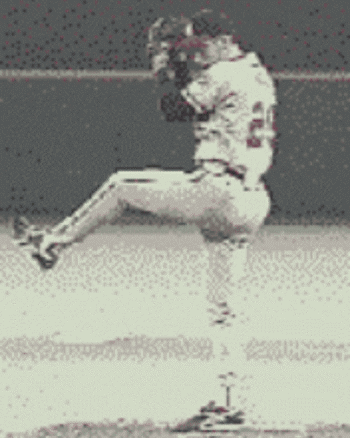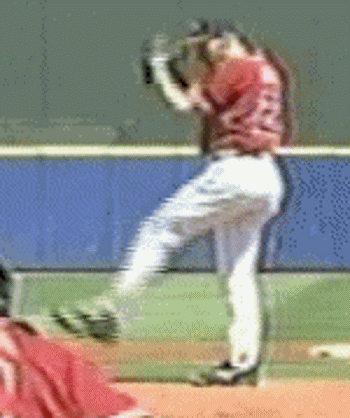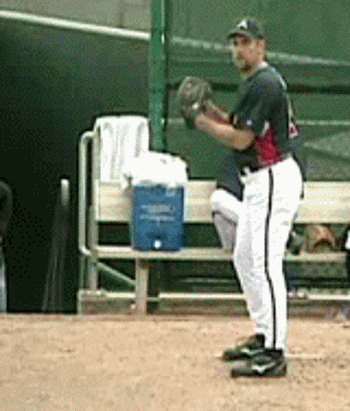Pitching Mechanics Analysis
John Smoltz
6/27/2008
John Smoltz is a pitcher who I have
long had mixed emotions
about.
On the one hand, John Smoltz is a likely Hall Of Famer
who has had tremendous success throughout his career. On the other hand, John Smoltz
has had a series of serious shoulder and elbow problems that
have limited him at various points in his career.
Let me explain what I see in John
Smoltz's arm action, why I believe it is the root cause of
his elbow and shoulder problems, and why I think his career may
be over.
John Smoltz and the Inverted W
I first came across the term
Inverted
W on Paul Nyman's Setpro.com web site. Nyman used the term
"Inverted W" to describe John Smoltz's arm action. While I think the
Inverted W is a (mostly) accurate description of John Smoltz's arm action, unlike
Paul I think it is an example of what not to do rather than
what to do.
I think the Inverted W has limited John
Smoltz's success rather than enabled it
I say that because I think the success of pitchers like
Greg
Maddux, Tom Glavine, Nolan Ryan, and
Roger Clemens — none of
whom make the Inverted W — tells me that the Inverted W is not
necessary to throwing either hard or well.

John Smoltz
John Smoltz is an example of a pitcher who breaks his hands
with his elbows (and who lets his elbow pick up the ball). After
breaking his hands, John Smoltz leads his arm
swing with his Pitching Arm Side (PAS) elbow so that his elbow
quickly gets above the level of his PAS forearm and hand.

John Smoltz

John Smoltz

John Smoltz
John Smoltz then continues to lift his elbows as he
scap
loads.

John Smoltz

John Smoltz
As a result, at the moment John Smoltz's Glove Side (GS) foot
plants, his shoulders start to rotate, and his PAS upper arm
starts to externally rotate, John Smoltz's PAS elbow is still
quite high and, more importantly, his PAS forearm is not yet
vertical and in the high-cocked position. This increases the
load on both his elbow and his shoulder (and in particular his
Labrum) by increasing the distance over which, and the force
with which, his PAS upper arm will externally rotate.
John Smoltz's Timing Problem
As I have said elsewhere, the
Inverted W and
the
Inverted L are
not (that) bad in and of themselves. Rather, they are
problematic because they can create a timing problem (akin to
rushing)
which can increase the load on a pitcher's elbow and the shoulder.
If you look at slow motion video of John Smoltz,
from various points in his career, you can see both
his Inverted W and the timing problem that results.

John Smoltz
I believe the clip above of John Smoltz is from relatively
early in his career. The thing to notice is how John Smoltz
comes to the Inverted L position in Frame 80. This creates a
timing problem by increasing the time it takes for his arm to
get to the high-cocked position. As a result, in Frame 89, when
John Smoltz's GS foot has planted and his shoulders have started
to rotate, his PAS forearm is only passing through the
horizontal.

John Smoltz
I believe the clip above of John Smoltz is from the last few
years. Notice how in Frame 33 you can see that John Smoltz
starts to lead his arm swing with his PAS elbow. Watch how high
his PAS elbow gets. In Frame 35, John Smoltz's PAS elbow has
reached its maximum height. John Smoltz's PAS elbow doesn't get
as high as the PAS elbow of Mark Prior, which is why I would
rate John Smoltz's arm action as borderline and why John Smoltz
hasn't experienced as many problems as Mark Prior has. However,
you can see that making the Inverted W hurts John Smoltz's
timing. Notice that his PAS forearm isn't vertical in Frame 36
at the moment that John Smoltz's GS foot plants and his
shoulders start to rotate.

John Smoltz - Spring 2008
The clip above of John Smoltz is from Spring 2008. The thing
to notice is how John Smoltz's arm action has changed since
early on in his career. The Inverted L is gone and the Inverted
W, while present, is less apparent. Instead, John Smoltz is
exhibiting more of a Horizontal W in this clip, which is good
and is what you see in the arm action of
Nolan Ryan. Notice how, while John
Smoltz still leads with his PAS elbow out of his hand break in
Frame 32, his PAS elbow is much lower in Frame 34, which is the
point of its maximum height. His timing problem is still present
in Frame 37, but is less prominent. His PAS forearm is closer to
vertical at the moment his GS foot plants and his shoulders
start to rotate.
The Bottom Line
The bottom line about John Smoltz is that he has always had a
problematic arm action, and poor timing as a result. This has
increased the load on his elbow and shoulder and has led to
problems with both of them. Labrum problems are a typical result
of timing problems and, because they can be so hard to fix
completely, I wouldn't be surprised if John Smoltz's career is
over.
|